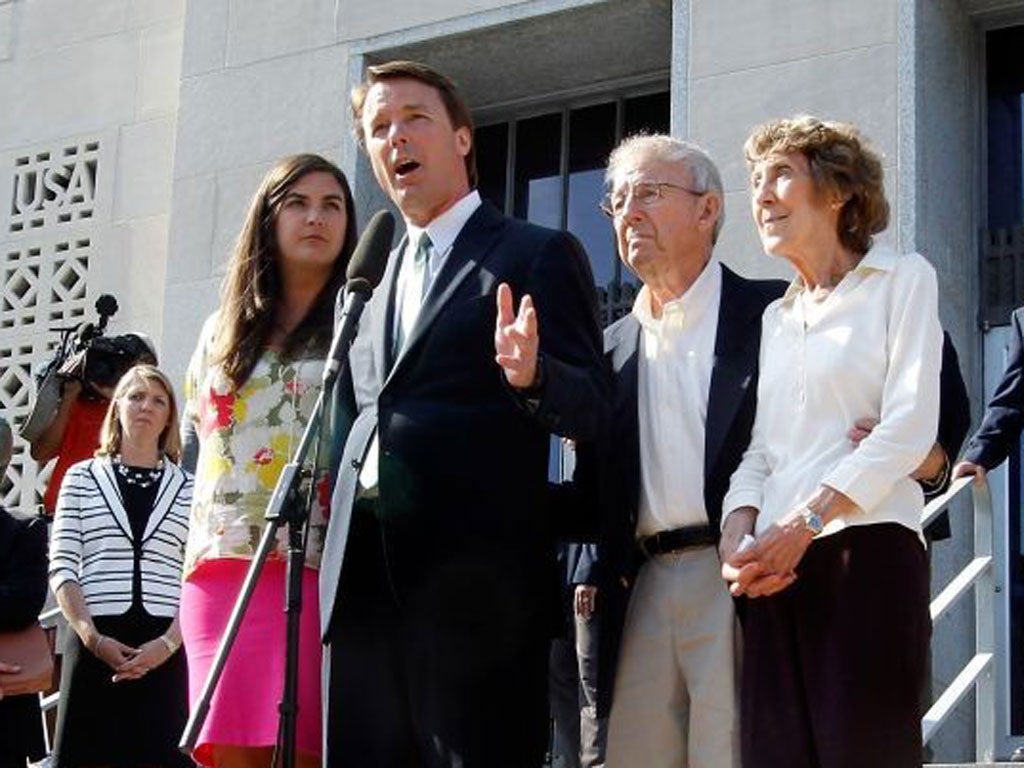First the hypocrisy, now the humiliation. So where does John Edwards go from here?
He may have walked free, but senator who hid affair from his dying wife faces a tougher battle in the court of public opinion

In the end no-one won. Not the US Justice Department, which lost the trial. Not John Edwards, who escaped conviction but saw his shattered reputation ground into even tinier fragments by weeks of excruciating public testimony. And certainly not the American taxpayer, who will foot the bill for the entire misguided legal exercise.
Theoretically, government prosecutors could retry the case, or at least the five counts of alleged corruption against the former Democratic presidential candidate on which the jury in Greensboro, North Carolina, was deadlocked. But that seems highly unlikely.
Rather, the general reaction yesterday from experts on campaign finance law was a blunt, "I told you so." Long before the 38-day trial opened on 23 April, the prevailing view was that the government did not have a case. Mr Edwards might be a despicable individual, but that did not mean he was a proven criminal. And that appears to have been the opinion of the jury, too.
According to the NBC television network yesterday, the panel was split 8-4 in favour of the former North Carolina senator on four of the unresolved counts, while only one of the 12 jurors wanted to convict him on the charge that he deliberately filed false reports to the watchdog Federal Election Commission. Faced with the deadlock, Judge Catherine Eagles had little choice but to declare a mistrial. It is improbable that a new jury at a second trial would be any more inclined to find Mr Edwards guilty. Appearing on ABC's Good Morning America show, some of the jurors explained their thinking.
"I felt like the evidence just wasn't there," said one, identified as Theresa Fuller, "it could have been a lot more."
For the Justice Department's Public Integrity Section (PIN) which brought the case against Mr Edwards, the outcome is a second big setback, after the botched trial in 2008 of Senator Ted Stevens of Alaska, whose initial conviction was struck down when it emerged that prosecutors had withheld key evidence that might have led to acquittal. Officials argue that the anti-corruption division does much quiet good work, securing dozens of guilty pleas every year that tend not to make big headlines. But the impression left by failed high-profile cases like this is that the policing of US campaign finance laws, complicated enough in the first place, can be erratic and unfair.
For the latter however, victory is Pyrrhic. Technically Mr Edwards is an innocent man, and will remain so unless convicted at a retrial. Although his political career has long been in ruins, he can theoretically return to practising law, where he made his initial fame and fortune. But his reputation is another matter. Of course, no rehabilitation is impossible. PIN was created in the wake of Watergate, arguably the one US political scandal that eclipses the Edwards affair. But the fate of several Watergate protagonists gives the lie to F Scott Fitzgerald's mistaken dictum that there are no second acts in American lives.
G Gordon Liddy, White House 'plumber' and organiser of the 1972 burglary of Democratic party headquarters, re-invented himself as a best-selling author and talk show host.
Charles Colson, Richard Nixon's feared hatchet-man, became a widely admired Christian leader and advocate of prison reform. By the end of his life, even Mr Nixon was a respected elder statesman, on foreign affairs, at least.
After Thursday's acquittal, Mr Edwards sounded duly contrite, saying he alone was responsible for the disgrace that has befallen him. Privately though, according to some of his few remaining friends, he has always wondered why the public was ready to forgive Bill Clinton, another admitted adulterer, but not him. The answer of course, lies in the scale of Mr Edwards' lies and hypocrisy, and his betrayal of friends, family, and cancer-afflicted wife. Maybe one day he too will be forgiven, after a long penance of good works and rediscovered faith. Or maybe not.
As Democratic consultant Chris Lehane put it to Politico yesterday: "He's at the epicentre of Dante's circles of hell" - one of those people who "are in such a deep, dark, dank un-spinnable place that their ability to climb out of it even with a long-term strategy, may not be doable."
Funding trials: The ones that got away with it
Bill Richardson
The former New Mexico Governor faced investigation last year over claims he raised $250,000 from supporters to pay off a woman who threatened to sue him for sexual harassment. In light of the Edwards verdict, there is speculation this case may be dropped.
Ted Stevens
Prosecutors from the Justice Department botched the case against the now-deceased former Senator of Alaska, who in 2008 stood trial for failing to declare gifts. But the case against him collapsed when it emerged that prosecutors had withheld evidence.
John Ensign
After the Stevens case, the Justice Department closed the case against the former Senator for Nevada, accused of illegally paying $96,000 to the husband of his mistress.
Subscribe to Independent Premium to bookmark this article
Want to bookmark your favourite articles and stories to read or reference later? Start your Independent Premium subscription today.

Join our commenting forum
Join thought-provoking conversations, follow other Independent readers and see their replies